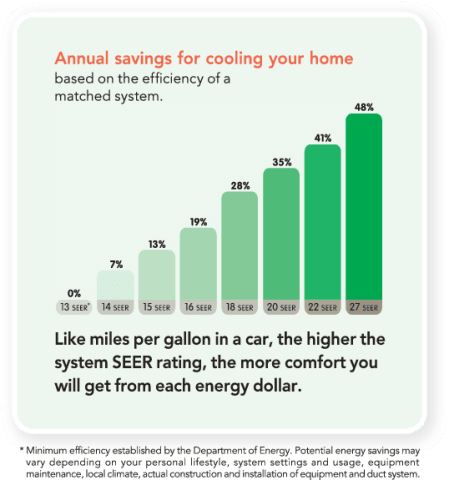Frequently Asked Questions About Our HVAC Services
SEER stands for Seasonal Energy Efficiency Ratio/Rating. This is the ratio of the cooling output of an air conditioner divided by the energy it uses in watt-hours.
An easy way to understand SEER is by comparing it with your car. Car efficiency is measured based on miles per gallon. How many miles can you drive your car for every gallon of gas consumed? Your air conditioner uses SEER to measure efficiency. How much comfort (cool air) can you get from every dollar spent?
Keep in mind that the SEER ratio measures the maximum efficiency that your air conditioner reaches but it could be impacted by several conditions (good system installation – proper sizing, insolation, adherence to code, etc.).
The minimum standard SEER for air conditioners is 13. The U.S. Department of Energy enforces minimum SEER requirements that differ by geographical region.
There are several considerations to decide what is the best SEER for your situation. These are some of the questions you can answer to understand whether you should go with a higher SEER or not.
- Are you replacing your main house AC system? Yes – you should consider a higher SEER. At the end of the day, it’s all about your comfort
- Do you spend most of your time at home (work from home, etc.)? Yes – you should consider a higher SEER. Again, your comfort is what really matters
- How long are you planning to stay at this property? If you have long-term plans with this property, you should consider a higher SEER
- How is your budget? If budget is not a concern, you should consider a higher SEER
The following image (source: Trane) provides a good example of potential savings by SEER

You can also visit this page to calculate potential saving in the long-term: https://www.seerenergysavings.com/
Yes, we are. This is the first question you should ask to any HVAC contractor. Unfortunately, there are too many contractors not properly licensed to manipulate HVAC equipment.
The states of North Carolina and South Carolina require contractors to be properly licensed to install a new HVAC system. Once your installation is completed, your HVAC contractor will coordinate with you the county inspection where the inspector will ensure that the installation meets all mechanical and electrical codes.
Although we don’t anticipate issues with your installation, it’s important that your contractor’s insurance covers major repairs. Accidents could happen and your contractor must be ready for it.
Being bonded means that your contractor has made payments for additional coverage with a bond. If something goes sideways, there is extra customer protection secured by a bond.
At City Air Experts, we are licensed, insured, and bonded.
We offer a 10-year warranty for registered equipment.
We offer a 1-year labor warranty for all our installations. If you are interested in an extended labor warranty, we do offer 5 and 10 years labor warranty extensions. Please ask us if you need more information.
We offer several financing options through Wells Fargo and Synchrony. Our “standard” financing option is shown in the proposal but we can work with you to find the perfect financing option based on your needs.
Today’s HVAC systems are 10x more efficient than a few years ago and that is why it is important that you choose a company that understands not only the new generation of air conditioning systems (of course!), but also how your home was built (or will be built) to proceed with the right air conditioning installation.
Oversizing or under-sizing your HVAC equipment can drastically impact your system lifetime and performance. Some people believe that oversizing could be good because you can reach your desired temperature faster. In reality, oversizing brings other issues such as humidity, an increase of power bill, etc.
Like many other HVAC contractors, we rely on our suppliers’ timeframe to set up our own delivery time.
Before the Installation:
- As soon as we received the signed proposal, we will contact our suppliers to order your new equipment (as of July 2021, there are some delays with equipment availability due to COVID-related issues)
- As soon as know your equipment availability, a member of our team will contact you to schedule your system installation.
- You will receive an automated text message from our system with the appointment details such as date, time, arrival window, and lead installer name.
During the Installation:
- Our installation crew will arrive during the arrival window and will proceed with the equipment installation.
- We will protect your house and furniture
- Our electrician will show up during the installation day to complete the electrical work.
After the Installation:
- We will coordinate the county inspection.
- We will provide all details to keep your unit at peak efficiency.
There are two types of customers; reactive and proactive customers.
Reactive customers will wait until their current system dies to replace it with a new unit.
Proactive customers will replace their current unit in advance to avoid breakdowns.
Both customers are correct because they are just following their personalities. There is nothing wrong with being on one side or another.
If you want to calculate the cost of replacing vs. keeping, we put together the following article for you: Cost of replacing my HVAC system
The Inflation Reduction Act (IRA), signed in August 2022, includes nearly $370B dedicated to climate and energy programs. The IRA included an expansion of the Non-Business Energy Property Tax Credit (Internal Revenue Code Section 25C), which provides a tax credit to homeowners when installing certain residential equipment. Notably, the expanded version of this tax credit is annual (not lifetime) and was renamed the Energy-Efficient Home Improvement Tax Credit (25C).
1/01/2023 through 12/31/2032 – The Energy Efficient Home Improvement Tax Credit provides homeowners up to 30% of installation costs for qualified expenditures, with an annual maximum of $1,200. Qualified air conditioners and furnaces can receive up to $600 each. Qualified heat pumps have a separate aggregate yearly limit, and a taxpayer could claim up to $2,000 for a qualifying heat pump. Thus, the maximum total yearly 25C credit amount may be up to $3,200.
$600 Tax Credit: Applicable for the installation of gas furnaces and air conditioners that meet the minimum requirements of the CEE Tiers seen in the reference table to the right. Furnaces and Air Conditioners do not have regional requirements.
$1200 Tax Credit: Applicable for the installation of Air Sourced Heat Pumps that meet the minimum requirements of CEE Tiers seen in the reference table to the right. Please note that the CEE has different Heat Pump requirements by region.
*Consult with your CPA about the Inflation reduction Act. City Air Experts is not responsible for processing these tax credits

